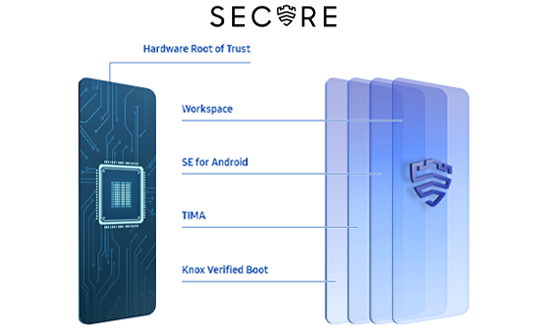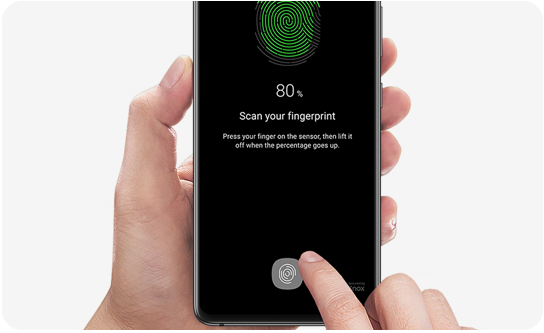How do I use the Smart Manager application to check for malware or viruses?
The presence of malware and the embedded Galaxy phone software routinely checks for malware and phishing scams running in the background on your phone.
Do Samsung phones have antivirus protection?
Samsung takes your security seriously and has partnered with McAfee to provide pre-installed anti-malware protection on your Galaxy phone. Flagship Samsung smartphones, including the sensational Galaxy Z Fold3 5G, Galaxy Z Flip3 5G, Galaxy S21 series and the latest Galaxy A series come pre-installed with McAfee anti-malware protection.

Samsung Knox provides another incredible layer of security. Built into Samsung devices including the epic Galaxy Z Fold3 5G, Galaxy Z Flip3 5G and Galaxy S21 Ultra 5G, you can be safe in the knowledge that your Galaxy phone is secure from the moment you unpack it and turn it on. The Knox platform contains security mechanisms that protect your data from malware and malicious threats. You can find a full list of Knox supported devices here.
You can also scan your device for malware and suspicious activity in the Battery and Device Care app*. Older Galaxy devices operating on Android 6 (Marshmallow) and below are protected by Samsung's Smart Manager application. Unsure which version of Android you have? You can check your Galaxy operating system here.
*Please note: the security settings terminology varies depending on the operating system being used
- Android 7.0 (Nougat): Device Maintenance
- Android 8.0 (Oreo): Device Maintenance
- Android 9.0 (Pie): Device Care
- Android 10.0: Device Care
- Android 11: Battery and Device Care
What are the signs my phone has a virus?
Whilst viruses and malware do not pose a significant threat to your Galaxy phone due to Samsung's industry leading security features, it is still important to be vigilant to a virus attack. The signs that your phone has been infected with a virus or malicious malware include:
- Your phone is operating slower
- Apps are taking longer to load
- The battery drains faster than expected
- You’re experiencing a lot of pop-up ads
- Your phone has apps you don’t remember downloading.
- Unexplained increase in data usage
- Higher than expected phone bills
- Your contacts have been receiving unusual messages from you that you haven’t sent
Be aware that unscrupulous advertisers will often use 'your device is infected' pop-ups to persuade you to click on them. These can be malware or phishing attempts, but they can also be trying to persuade you to download an app or visit their website. These pop-ups will usually turn up while you are browsing the Internet and signs that they are not genuine include continual buzzing, bright flashing lights or garish text.
How can I check for viruses and malware on my Android phone?
Galaxy security software will be working hard to keep your phone secure from any threats to your personal data. Samsung devices operating Android 7 (Nougat) and above will automatically run a diagnostic check to ensure your phone is protected. Your Galaxy phone is set to automatically optimise itself once a day and check for any security threats. You can find out more information on our Device Care page.

You can also manually scan your Galaxy device to check for security threats:
If you are using Android 6 (Marshmallow) or below the Smart Manager application can be used to check for viruses and malware on your phone.
Run a security scan by following the steps below:
You can also use Google Settings to scan your phone for security threats:
If any security threats are detected your Galaxy smartphone will guide you through the process of removing and securing your phone.
How can I remove the malware or virus from my Android Galaxy phone?
If you’ve identified malware or viruses on your phone, it’s important to stop the malware from causing any further damage.
Here are a few steps you can take to clean your phone from viruses:
1. Uninstall any unrecognised apps
Access Safe mode on your Galaxy device to determine any apps that are operated by a third party and may therefore be malicious using the steps below:
2. Delete your browser cache
It’s worth clearing the cache and data when your phone is behaving in an unusual way and you suspect a virus or malware.
If you are using the Samsung Internet app:
If you are using Google Chrome:
3. Perform a Factory reset
Most malware can be removed by performing a factory reset on your phone. Before you undertake a factory reset you need to ensure that you have saved any data you want to access after you perform the reset, otherwise you run the risk of losing it all. Follow the steps below to factory reset your Galaxy phone:
Please remember, if you’ve identified malware or had a virus attack on your Galaxy phone it is important to change your passwords and PINs as soon as possible. Remember to change them on a different device to ensure the malicious software does not detect your new passwords.
What happens if I leave malware or a virus on my phone?
Malware is ultimately designed to generate revenue for cybercriminals. If you leave malware or viruses on your phone cybercriminals can access your data and steal your personal information for illicit purposes.
Malware allows criminals to:
- Access your passwords
- Access your location
- Access your contact list
- Make your phone send SMS messages to premium rate text services
- Install adware that forces you to view web pages or download apps
You should secure your Galaxy phone as soon as you become aware of malware or a virus attack on your phone by following the steps in the ‘How should I remove malware or virus from my Android phone’ section.
How do I avoid getting infected with malware or a virus on my phone?

Although malware and viruses are very rare on Android Galaxy phones, for the highest level of protection we recommend taking the following extra precautions to protect your phone:
- Always keep your operating system and apps up-to-date with the latest software and security updates.
- Ensure the embedded security features on your Galaxy device are activated at all times.
- Avoid being bombarded with malicious Ads by downloading an Ad Blocker.
- Only download or install apps from the Galaxy Store and the Google Play Store.
- Avoid clicking on suspicious or unfamiliar links in emails and text messages.
- Use strong, complicated passwords or a password manager.
- Never use unsecured Wi-Fi connections and always use a VPN when connecting to public Wi-Fi.
- Avoid installing third-party apps from unknown sources.
- Take the time to review app permissions before you download them. If an app request seems unusual it’s likely to be malicious.
- Avoid rooting your smartphone which will remove the verified Samsung and Android software from your phone and void the guarantee.
Need further assistance?
If you're experiencing unusual behaviour on Samsung mobiles, tablets or wearables, you can send us an error report or ask us a question in the Samsung Members app.
This allows us to a closer look at what is happening. The data is anonymised and only held for the duration of the investigation. Find out more about sending an error report through the Samsung Members app.
Is this content helpful?
Thank you for your feedback!
Please answer all questions.

